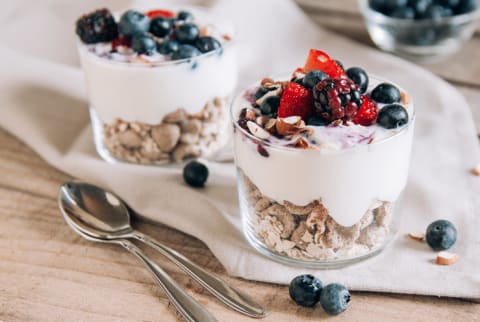Advertisement
11 Foods To Make You Feel Great, Fast


We all understand the need to eat. We often forget, though, what we eat might influence how we feel. We sometimes choose snacks based on what looks or sounds good in the moment, without paying much attention to how it will affect us.
Many foods make us happy while we’re eating, think ice cream, cookies, candy, French fries and fried chicken. But these foods can leave us feeling tired and lethargic within an hour of consuming them.
It’s common to feel bloated, tired, foggy or just plain sick after eating greasy, fatty foods or to experience a rush of energy followed by an energy crash when consuming sugary foods.
Want to feel great, not only while you’re eating, but an hour or more later? Try adding these 11 healthy foods into your diet. They’re sure to keep you feeling good and energized long after you’ve enjoyed them.
1. Spinach
Rich in magnesium1, a natural muscle relaxant and stress-reducer, spinach can help calm you, lessening the symptoms of stress. When your body is under stress or anxiety, you can deplete your magnesium levels. Spinach can help reverse this. Additionally, spinach is rich in vitamins A2 and C. Get your dose of vitamins by using it in salads, as a healthy pizza topping, or add it to soups, stews, pasta sauce or smoothies.
2. Berries
Blueberries, strawberries, blackberries and raspberries are antioxidant-rich and high in vitamin C, which has been shown to fight stress while strengthening the immune system. My favorites are blueberries and blackberries. Although I love cooking with berries — cobblers, crumbles, etc. — I find it easy to simply add berries to cereal, oatmeal and salads.
3. Yogurt
Yogurt is an excellent source of calcium3, which is important for bone health as well as proper nerve and muscle function. A 6-ounce serving size can provide up to 20% of the daily recommendation. It is also a good source of beneficial probiotic bacteria, and since it’s high in protein, yogurt can be a perfect way to start your day and can keep you full until lunch.
With yogurt, remember to check the labels — some flavored yogurts can contain a lot of sugar and long ingredients lists. I love using yogurts with simple ingredients and no artificial preservatives, thickeners, sweeteners, flavors or colors like Stonyfield, Icelandic Provisions, or siggi’s Icelandic-style skyr. They all use less sugar than most brands.
4. Quinoa
This tiny, protein-packed seed cooks up into fluffy, tender grains and can be added to salads and soups or served as an accompaniment to seafood, poultry or meat. Quinoa provides all of the essential nine amino acids, making it especially useful in health-conscious, plant-based cooking.
5. Fish
Fish that are rich in omega-3 fatty acids4, like tuna and salmon, can boost serotonin (a mood-regulating neurotransmitter) and keep the stress hormones, adrenaline and cortisol, under control. I love topping grilled fish with chutney or relish made with fresh fruit and vegetables.
6. Oats
The L-tryptophan in a bowl of warm oats can help boost serotonin levels5, which helps combat symptoms of stress and anxiety. High in fiber, oats will also keep you full longer, helping to ward off the emotional eating that often accompanies stress.
7. Cherries
With 17 different antioxidant compounds, cherries have been found to help reduce inflammation and slow signs of aging6. Try adding a small amount of dried cherries to your salads or keep frozen cherries on hand for a quick and healthy smoothie.
8. Nuts & seeds
Healthy fats, such as nuts, help create healthy inflammatory biomarkers.7 Nuts offer a beneficial dose of fiber, calcium, vitamin E, omega-3 fatty acids and antioxidants. Sprinkle over salad, cereal or yogurt for a healthy and satisfying crunch.
9. Tea
Tea is loaded with antioxidants and phytochemicals8 that are known to help fight free radicals, which may reduce the risk of certain cancers. Tea is not only good for your bones — green tea has been shown to improve bone mineral density — but it may also help strengthen your immune system. Tea may help promote weight loss and it may also ward off cravings and help you make better food choices.
10. Avocados
Avocados are the definition of “healthy fats.” Packed full of essential amino acids, monounsaturated fats, fiber, vitamins and minerals, these essential nutrients in avocados have been proven to protect against metabolic disorders.
11. Beans & legumes
Low on the glycemic index—meaning they won’t spike your blood sugar and trigger inflammation—beans are full of fiber as well as folic acid, magnesium, and potassium and are high in protein and iron. Incorporate different types of beans into your diet to help keep inflammation at bay.
8 Sources
- https://ods.od.nih.gov/factsheets/Magnesium-HealthProfessional/
- https://ods.od.nih.gov/factsheets/VitaminA-Consumer/
- https://ods.od.nih.gov/factsheets/Calcium-Consumer/
- https://ods.od.nih.gov/factsheets/Omega3FattyAcids-HealthProfessional/
- https://www.ncbi.nlm.nih.gov/pmc/articles/PMC2908021/
- https://www.ncbi.nlm.nih.gov/pmc/articles/PMC5187531/
- https://www.ncbi.nlm.nih.gov/pmc/articles/PMC4997300/
- https://www.ncbi.nlm.nih.gov/pubmed/26164000
